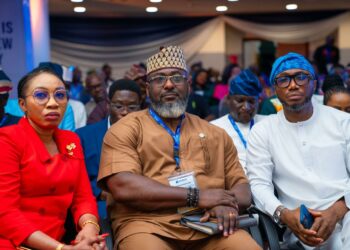No doubt, 2023 has been one of the most challenging years in operational history in Nigeria.
The year started with the announcement by the Central Bank of Nigeria’s (CBN), on Naira redesign policy and cash withdrawal limit. This created interruptions in economic operations and widespread hardship in the first two months of 2023 (January & February 2023).
According to stakeholders, the policy created a liquidity crisis and coupled with the uncertainties surrounding the elections, economic activities were almost grounded to a halt.
In addition to dealing with the effects of the cash crunch and an election with uncertain results, businesses were also attempting to recover from the effects of COVID-19 and adapt to the instability brought on by the Russian-Ukrainian war.
Barely a month after the removal of fuel subsidy, the government, in an attempt to switch to a unified, market-reflective foreign exchange (FX) rate, decided to float the naira. Instantly the exchange rate moved from the official rate of N460/$ to ranges of N800 to N1099 and the parallel market went above N1300/$ at some point.
The harsh economic conditions orchestrated by these policies have indeed crippled the operations of many small and medium companies and the ICT sector was not immune.
Following the devaluation of the naira in June 2023, telecom operators made losses, according to their financial reports.
For instance, MTN Nigeria Communications Plc and Airtel Africa Plc disclosed N479.11 billion in foreign exchange losses. From 461/$1 in December 2022 to 777/$1 in September 2023, MTN reported a forex loss of N232.8 billion on its net foreign currency liabilities in its nine-month financial report for the year.
The telecom company averred that it had to heavily rely on letters of credit to meet its capital expenditure requirements because there was not enough foreign exchange available in the market.
MTN said, “Given the protracted forex paucity in the market, MTN Nigeria utilised trade lines to fund the establishment of confirmed irrevocable letters of credit for its network capex investments to sustain revenue growth. “Our recognised forex loss for the nine months to September 2023 was 77 per cent higher than the amount reported in H1 2023, where we measured all the trade lines after offsetting the naira-denominated cash cover that was provided to the banks. Following further analysis and review, we have remeasured all our trade lines to correctly exclude the naira-denominated cash cover that was provided to the banks.”
For Airtel, it stated, ““Loss after tax was $13million driven largely by a foreign exchange loss of $471million recorded in finance cost before tax and $317million after tax because of the devaluation of the Nigerian naira in June 2023. This impact has been classified as an exceptional item.
“The exceptional item of $471million is on account of derivative and foreign exchange losses following the Nigerian naira devaluation in June 2023 (from 465 NGN/USD in May 2023 to 752 NGN/USD in Jun 2023). This has resulted in an exceptional tax gain of $154million. Tax exceptional items in the previous period benefited from the initial recognition of a deferred tax credit of $42million in Kenya.
“In some markets, we face instances of limited supply of foreign currency within the local monetary system. This not only constrains our ability to fully benefit at group level from strong cash generation by those OpCos but also impacts our ability to make timely foreign currency payments to our international suppliers.”
Other hurdles operators in the ICT sector had to contend with includes multiple taxation, poor Quality of Service (QoS), limited forex supply, and broadband penetration.
The president of the Association of Telecommunications Companies of Nigeria (ATCON), Mr. Tony Emoekpere, listed one of such challenges as multiple taxation, of which he tasked the Nigerian Communications Commission (NCC) and other stakeholders to look at ways to addressing it, along with other challenges.
In the same vein, the chairman, Association of Licensed Telecommunications Operators of Nigeria (ALTON), Engr. Gbenga Adebayo, averred that telecom operators have continue to bear the brunt of multiple taxation and coerced compliance with tax and levy demands that have no legal basis by sub-nationals for years, adding that this threatens investment, sustainability and industry growth.
Adebayo listed some of the taxes and levies as ecology tax for gaseous emission; sewage, sanitation and public convenience levy for base stations; fumigation levies: states demand for the payment of fumigation charges of base station; sanitation and refuse effluent tax for base stations; business premises tax for base stations; annual renewal on Right of Way (RoW) and fire service levy.
He lamented that tenements rates charged per base station in some states is far higher than rates per square metre charged by the same state for residential and commercial buildings when the infrastructure occupies the same land.
On RoW, the national president, National Association of Telecoms Subscribers (NATCOMS), Chief Adeolu Ogunbanjo averred that most states government still charge as high as N5000 for RoW. This is one of the reasons why broadband penetration is still below 50 per cent, Ogunbanjo said, adding that Anambra state has waived RoW charges. If all states government waived their RoW charges, Nigeria will be able to achieve 70 per cent broadband penetration by 2025,” Ogunbanjo assured.
Increased Agitation Of Tariff Review
The year 2023 saw an increased in agitation by telecom operators to increase call and data tariff. Citing increasing cost of business operations and the harsh economy, the telecom operators proposed an upward review of the mobile termination rate for voice services and the institution of an interim adjustment of the telecom industry’s floor price for voice and data services.
However, Ogunbanjo countered their arguments, thereby urging the Nigerian Communications Commission (NCC) to ignore such agitations, as it will be unfair to Nigerians, who are grabbling with a lot of challenges. “We know operators are not immune to the harsh economy. However, Nigerians are also bearing the brunt as well. Increasing call tariff, at this critical time that is hard to deal with, will be unfair to subscribers,” he averred.
ISPs Not Immune
Head, Enterprise Sales, FiberOne Broadband Limited, Mr. Kenny Joda, also talked about the challenges faced by Internet Service Providers (ISPs). According to Joda, about 90 per cent out of the 568 indigenous ISPs in Nigeria are struggling due to multiple taxation, infrastructure, high cost of doing business and forex, among others.
ICT’s Contribution To GDP Surge In 2023
Despites these challenges, activities in Information and Communications Technology (ICT) contributed 15.97 per cent to Nigeria’s real Gross Domestic Product (GDP) in Q3 2023.
The National Bureau of Statistics (NBS) disclosed this in the Q3 GDP statistics released on Friday. This shows an increase in contribution when compared to the 15.35 per cent recorded in the same period last year.
According to NBS, the ICT sector comprises the four activities of Telecommunications and Information Services; Publishing; Motion Picture, Sound Recording, and Music Production; and Broadcasting.
“The ICT sector in the third quarter of 2023 recorded a growth rate of 6.69 per cent in real terms, year-on-year. This was driven largely by activities in the telecommunications sub-sector, which contributed 13.50 per cent to the GDP in the real term.
The telecom industry, which is dominated by mobile network operators including MTN, Globacom, Airtel, 9mobile, and Internet Service Providers (ISPs) is also driving a lot of activities in every other sector of the economy. The closest sub-sector to telecoms in the ICT sector in terms of contribution was broadcasting, which added 1.39 per cent.”





